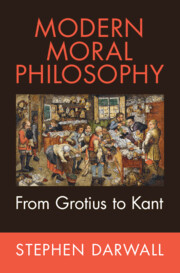Book contents
- Modern Moral Philosophy
- Modern Moral Philosophy
- Copyright page
- Dedication
- Contents
- Preface
- Acknowledgments
- Introduction
- 1 Grotius
- 2 Hobbes and Pufendorf
- 3 Locke and Cumberland
- 4 Spinoza, Cudworth, Shaftesbury, and Leibniz
- 5 Hutcheson and Butler
- 6 Hume and Smith
- 7 The British Rationalists and Reid
- 8 Rousseau and Kant
- Works Cited
- Index
6 - Hume and Smith
Published online by Cambridge University Press: 10 June 2023
- Modern Moral Philosophy
- Modern Moral Philosophy
- Copyright page
- Dedication
- Contents
- Preface
- Acknowledgments
- Introduction
- 1 Grotius
- 2 Hobbes and Pufendorf
- 3 Locke and Cumberland
- 4 Spinoza, Cudworth, Shaftesbury, and Leibniz
- 5 Hutcheson and Butler
- 6 Hume and Smith
- 7 The British Rationalists and Reid
- 8 Rousseau and Kant
- Works Cited
- Index
Summary
David Hume and Adam Smith were contemporaries, interlocutors, compatriots, and friends, who, along with Hutcheson, helped shape the remarkable period of intellectual activity in eighteenth-century Scotland known as the Scottish Enlightenment. They inherited Hutcheson’s sentimentalist approach: a form of moral empiricism that is opposed to ethical rationalism and that continues to find resonance today. Hume’s version has had the greatest influence, including in contemporary discussion.
For his part, Adam Smith is, of course, best known for his writings on economics. But Smith’s Theory of Moral Sentiments is arguably one of the greatest works on moral psychology ever written. Smith shows the ubiquity of imaginative perspective-taking in our mental moral lives, both in attributing mental states to others (and in everyday normative judgments of the fittingness, or “propriety” as Smith calls it, of attitudes to the objects they have in view). Moreover, Smith connects fellow-feeling with mutual respect and accountability. Our capacity to take on others’ perspectives and regulate our conduct toward them from an informed and impartial second-personal point of view figures centrally both in Smith’s account of justice.
- Type
- Chapter
- Information
- Modern Moral PhilosophyFrom Grotius to Kant, pp. 201 - 236Publisher: Cambridge University PressPrint publication year: 2023

